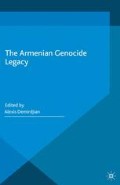Abstract
A century has passed since the annihilation of the Ottoman Armenians by the Young Turk regime, without the Turkish Republic having shown any signs of self-critically facing its genocidal past. In the last hundred years we have witnessed how Turkey not only tried to annihilate the Armenians physically but erase them from memory by means of political power, suppression or outright violence. After being present in Anatolia for centuries, Armenians are decimated into a tiny minority in Turkey, where being Armenian — or anything associated with Armenians for that matter — is perceived as derogatory. In 2008, for instance, Turkish President Abdullah Gul felt compelled to publicize his family tree showing his Turkish and Muslim lineage as far back as six centuries into history following claims that his mother had Armenian origins. The President also filed a lawsuit against the claimer for assault on his ‘personal and family values, honour and reputation’.2 The claimer in turn insisted on a DNA test, since according to her, this was the only reliable way to prove one’s ethnic origins.3
Access this chapter
Tax calculation will be finalised at checkout
Purchases are for personal use only
Preview
Unable to display preview. Download preview PDF.
Notes
S. Bayraktar (2010) Politik und Erinnerung. Der Diskurs über den Armeniermord in der Türkei zwischen Nationalismus und Europäisierung (Bielefeld: Transcript, Verlag).
B. Ayata (2015) ‘Turkish Foreign Policy in a Changing Arab World: Rise and Fall of a Regional Actor?’, Journal of European Integration, Vol. 37 (1): 95–112.
S. Bayraktar (2015) ‘Remembering the Armenian Genocide in Contemporary Turkey’, Testimony between History and Memory, No. 120: 61–9.
R. N. Bali (2006) ‘Ermeni Kiyiminin 50. Yildönümünün Yansimalari’, Toplumsal Tarih, p. 159. See Chapter 11, Elmas, on the 1965 mobilization.
US Department of State, Patterns of Global Terrorism, Appendix B, 1996, cited in B. Phillips (2012) Diplomatic History: The Turkey –Armenia Protocols, http://hrcolumbia.org/peacebuilding/diplomatic_history.pdf, p. 3. Bobelian (2012). See also Chapter 11, Elmas, on ASALA activity.
Bayraktar (2010), pp. 147–51; J. M. Dixon (2010) ‘Defending the Nation? Maintaining Turkey’s Narrative of the Armenian Genocide’, South European Society and Politics, Vol. 15 (3): 467–85.
A prominent example of Turkey’s attempts to prevent debates on the Armenian Genocide is the ‘International Conference on the Holocaust and Genocide’ which took place in Tel Aviv in 1982 against high political pressure (Y. Auron (2000) The Banality of Indifference. Zionism and the Armenian Genocide ( New Brunswick: Transaction Publishers ), pp. 217–21))
J. M. Dixon (2011) ‘Changing the State’s Story: Continuity and Change in Official Narratives of Dark Pasts’, Dissertation, University of California, Berkeley.
A. Giannakopoulos and K. Maras (eds) (2005) Die Türkei -Debatte in Europa. Ein Vergleich ( Wiesbaden: Verlag Sozialwissenschaften );
A. Wimmel (2005) ‘Transnationale Diskurse in der europäischen Medienöffentlichkeit: Die Debatte zum EU-Beitritt der Türkei’, Politische Vierteljahresschrift, Vol. 46 (3): 459–83.
H.-U. Wehler (2004) ‘Die Türkische Frage. Europas Bürger müssen sich entscheiden’, in C. Leggewie (ed.) Die Türkei in Die Europäischen Union? Zu den Positionen einer Debatte ( Frankfurt: Suhrkamp ), pp. 57–69; Gerhards (2005).
Z. Meral (2010) Prospects for Turkey, http://www.academia.edu/2462636/Prospects_for_Turkey, p. 40.
International Center for Transitional Justice (ICTJ) (2002) The Applicability of the UN Convention on the Prevention and Punishment of the Crime of Genocide to Events which Occurred During the Early Twentieth Century, http://www.ictj.org/sites/default/files/ICTJ-Turkey-Armenian-Reconciliation-2002-English.pdf.
J. Kalpakian and V. Ipek (2011) ‘The Turkish-Armenian Rapprochment Processes: A Case Study Approach’, Digest of Middle East Studies, Vol. 20 (2): 291–321 (299)
For the meaning and role of ‘tactical concessions’ see T. Risse, S. C. Ropp and K. Sikkink (1999) The Power of Human Rights: International Norms and Domestic Change ( Cambridge: Cambridge University Press).
B. Ayata (2012) ‘Tolerance as a European Norm or an Ottoman Practice? An Analysis of the Turkish Public Debates on the (Re)Opening of an Armenian Church in the Context of Turkey’s EU Candidacy and Neo-Ottoman Revival’, KFG Working Paper Series, No. 41.
F. Balançar (ed.) (2011) Sessizligin Sesi. Türkiyeli Ermeniler Konusuyor ( Istanbul: Uluslararasi Hrant Dink Vakfi Yayinlari ).
A. Erbal (2012) ‘Mea Culpas, Negotiations, Apologias: Revisiting the “Apology” of Turkish Intellectuals’, in B. Schwelling (ed.) Reconciliation, Civil Society, and the Politics of Memory. Transnational Initiatives in the 20th and 21st Century ( Bielefeld: Transcript, Verlag ), pp. 51–95.
M. Mamigonian, ‘Comment on the Turkish Apology Campaign’, Armenian Weekly, 21 April 2009.
Author information
Authors and Affiliations
Editor information
Editors and Affiliations
Copyright information
© 2016 Seyhan Bayraktar
About this chapter
Cite this chapter
Bayraktar, S. (2016). The Politics of Denial and Recognition: Turkey, Armenia and the EU. In: Demirdjian, A. (eds) The Armenian Genocide Legacy. Palgrave Studies in the History of Genocide. Palgrave Macmillan, London. https://doi.org/10.1007/978-1-137-56163-3_13
Download citation
DOI: https://doi.org/10.1007/978-1-137-56163-3_13
Publisher Name: Palgrave Macmillan, London
Print ISBN: 978-1-349-57402-5
Online ISBN: 978-1-137-56163-3
eBook Packages: HistoryHistory (R0)

